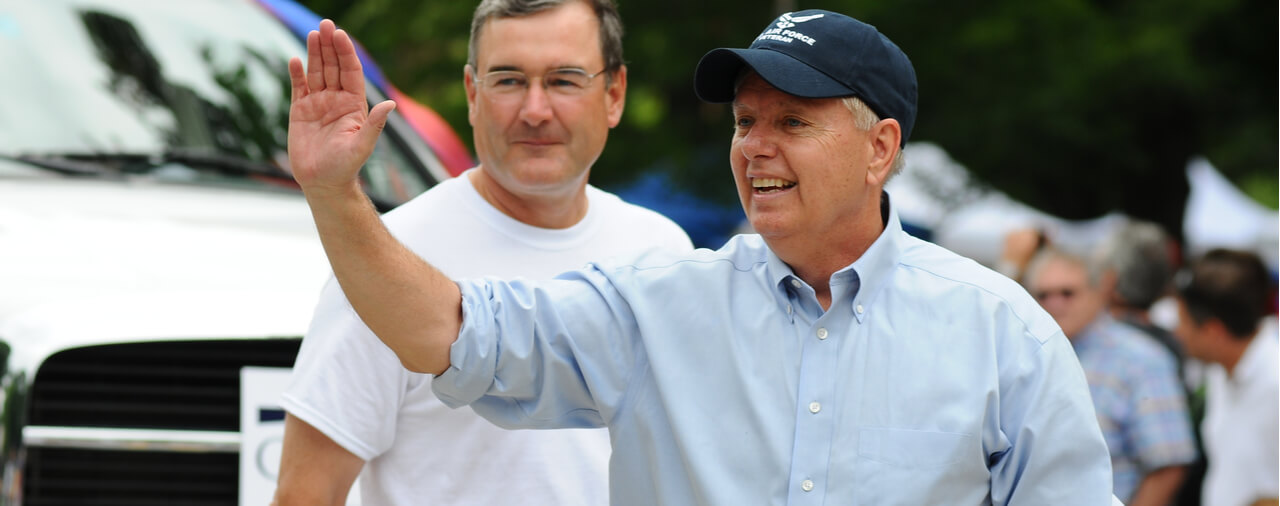Thoughts on the End of the Lindsey Graham Campaign and the State of the GOP Primary
Thoughts on the End of the Lindsey Graham Campaign
On December 21, 2015, Senator Lindsey Graham [see blog] of South Carolina suspended his campaign for President (see his announcement here). As I noted in my candidate profile about the good Senator from South Carolina, I have always appreciated his good work in the United States Senate.
I believe that the primary purpose of Senator Graham's campaign was to advocate for a muscular foreign policy against some of the less-interventionist strains of thought in the contemporary conservative movement. To that effect, I believe that his campaign had a far more substantial effect on the Republican race, and the national debate, than one would think just by looking at his poll numbers. In each of the so-called “undercard” debates that he was a part of, Senator Graham made waves by explaining his educated and reasoned foreign policy perspective to a national audience. Conservatives of all stripes, including those who are less inclined to agree with Senator Graham, should take a moment to acknowledge his valuable contributions to a Republican campaign season that has too often been dominated by the sensationalist news coverage of Donald Trump's latest utterances.
While Senator Graham is no longer a part of the Republican field, I look forward to his continuing to influence the national debate from his seat in the United States Senate.
Effect of Graham's Departure
There have been reports that some Republican Senators, Representatives, and donors (especially in South Carolina) have held back from making an endorsement in the race out of respect for Senator Graham. Furthermore, the 2008 nominee, Senator John McCain of Arizona, actually endorsed the Graham campaign. It will bear watching to see whether Congress members who have held back on making an endorsement jump into the fray. For that matter, it will bear watching whether Senators Graham and McCain decide to make endorsements.
State of the Race
Senator Graham's departure reduces the Republican field to a still substantial thirteen candidates. To read what I think about nearly the entire Republican and Democratic Presidential candidates, please see my Presidential candidate profiles [see blog].
Let us look at the Republican poll averages for the national race and the first three voting states courtesy of Real Clear Politics as of December 23, 2015:
National1
1. Donald Trump — 35.1%
2. Senator Ted Cruz — 18.1%
3. Senator Marco Rubio — 11.5%
4. Ben Carson — 10.0%
5. Jeb Bush — 4.4%
6. Governor Chris Christie - 3.9%
Iowa2
1. Senator Ted Cruz — 30.2%
2. Donald Trump — 26.2%
3. Senator Marco Rubio — 12.3%
4. Ben Carson 10.0%
5. Jeb Bush 5.2%
New Hampshire3
1. Donald Trump — 28.3%
2. Senator Ted Cruz — 12.0%
3. Senator Marco Rubio — 12.0%
4. Governor Chris Christie — 11.3%
5. Jeb Bush - 8.0%
South Carolina4
1. Donald Trump — 33.7%
2. Senator Ted Cruz — 19.3%
3. Senator Marco Rubio — 12.7%
4. Ben Carson — 11.3%
5. Jeb Bush - 7.3%
It is always important to remember that history teaches us to read these poll averages with a large dose of caution. Many voters are still not paying much attention to the race, and many polls both do not screen for “likely” voters and have significant margins of error. Nevertheless, I have three thoughts to share with regard to the current state of the polls:
I. Senator Ted Cruz of Texas has emerged as the top challenger to Donald Trump at the moment. While most national polls (unfortunately) still show Trump with a large lead, Senator Cruz has opened up a meaningful lead in recent Iowa polls. It would be fascinating to see how a Cruz win in Iowa, especially a wide win, would affect Trump's support in New Hampshire and beyond.
II. Senator Marco Rubio of Florida appears to still be the favorite among candidates who would be appealing to the Republican “establishment,” as he now sits in the top-3 in all four of the polls that we are looking at. However, while Senator Rubio looks reasonably strong everywhere, he does not look particularly strong anywhere (like Senator Cruz does in Iowa). It will bear watching whether the Rubio campaign has invested enough in any of the first couple of states in order to pick up an early win.
III. Finally, my top choice, Governor Chris Christie of New Jersey, appears to be making his move in New Hampshire. Governor Christie has invested substantial resources into the Granite State, and between that and his stellar debate performances, has moved himself back into the conversation in a big way. I believe that with a strong showing in New Hampshire, Governor Christie would have a chance to become the “establishment” favorite and compete seriously to win the nomination. None of this seemed likely when I wrote my candidate profile for Governor Christie, so I am excited to see that it looks like voters are finally giving him their consideration.
______________________
- http://webcache.googleusercontent.com/search?qcache:W008qqHthAQJ:www.realclearpolitics.com/epolls/2016/president/us/2016_republican_presidential_nomination-3823.html+&cd=1&hlen&ctclnk&glus
- http://webcache.googleusercontent.com/search?qcache:Ae-dWp_VRPUJ:www.realclearpolitics.com/epolls/2016/president/ia/iowa_republican_presidential_caucus-3194.html+&cd=1&hlen&ctclnk&glus
- http://webcache.googleusercontent.com/search?qcache:9UltFupj0RcJ:www.realclearpolitics.com/epolls/2016/president/nh/new_hampshire_republican_presidential_primary-3350.html+&cd=1&hlen&ctclnk&glus
- http://webcache.googleusercontent.com/search?qcache:-BS_mLBY09QJ:www.realclearpolitics.com/epolls/2016/president/sc/south_carolina_republican_presidential_primary-4151.html+&cd=3&hlen&ctclnk&glus

- Alexander J. Segal's blog
- Log in to post comments
